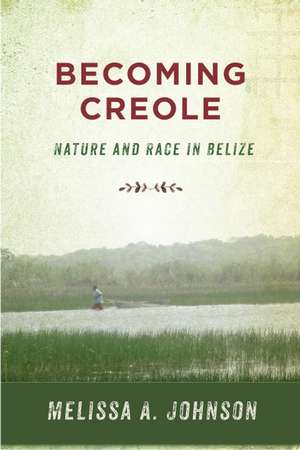Becoming Creole: Nature and Race in Belize: Critical Caribbean Studies
Autor Melissa A. Johnsonen Limba Engleză Paperback – noi 2018
Becoming Creole explores how people become who they are through their relationships with the natural world, and it shows how those relationships are also always embedded in processes of racialization that create blackness, brownness, and whiteness. Taking the reader into the lived experience of Afro-Caribbean people who call the watery lowlands of Belize home, Melissa A. Johnson traces Belizean Creole peoples’ relationships with the plants, animals, water, and soils around them, and analyzes how these relationships intersect with transnational racial assemblages. She provides a sustained analysis of how processes of racialization are always present in the entanglements between people and the non-human worlds in which they live.
Din seria Critical Caribbean Studies
-
 Preț: 283.83 lei
Preț: 283.83 lei -
 Preț: 258.06 lei
Preț: 258.06 lei -
 Preț: 203.79 lei
Preț: 203.79 lei -
 Preț: 243.85 lei
Preț: 243.85 lei -
 Preț: 245.95 lei
Preț: 245.95 lei -
 Preț: 185.09 lei
Preț: 185.09 lei -
 Preț: 318.70 lei
Preț: 318.70 lei -
 Preț: 334.71 lei
Preț: 334.71 lei -
 Preț: 210.64 lei
Preț: 210.64 lei -
 Preț: 204.10 lei
Preț: 204.10 lei -
 Preț: 253.93 lei
Preț: 253.93 lei -
 Preț: 314.72 lei
Preț: 314.72 lei -
 Preț: 346.99 lei
Preț: 346.99 lei -
 Preț: 262.40 lei
Preț: 262.40 lei -
 Preț: 316.55 lei
Preț: 316.55 lei -
 Preț: 366.31 lei
Preț: 366.31 lei -
 Preț: 361.12 lei
Preț: 361.12 lei -
 Preț: 370.28 lei
Preț: 370.28 lei - 23%
 Preț: 778.68 lei
Preț: 778.68 lei -
 Preț: 359.13 lei
Preț: 359.13 lei - 23%
 Preț: 779.75 lei
Preț: 779.75 lei -
 Preț: 251.36 lei
Preț: 251.36 lei -
 Preț: 218.16 lei
Preț: 218.16 lei - 10%
 Preț: 910.98 lei
Preț: 910.98 lei - 10%
 Preț: 910.98 lei
Preț: 910.98 lei -
 Preț: 267.04 lei
Preț: 267.04 lei - 10%
 Preț: 910.98 lei
Preț: 910.98 lei -
 Preț: 360.09 lei
Preț: 360.09 lei -
 Preț: 323.83 lei
Preț: 323.83 lei - 10%
 Preț: 910.98 lei
Preț: 910.98 lei -
 Preț: 359.04 lei
Preț: 359.04 lei - 51%
 Preț: 498.27 lei
Preț: 498.27 lei -
 Preț: 405.13 lei
Preț: 405.13 lei
Preț: 362.28 lei
Nou
Puncte Express: 543
Preț estimativ în valută:
69.32€ • 72.53$ • 57.59£
69.32€ • 72.53$ • 57.59£
Carte indisponibilă temporar
Doresc să fiu notificat când acest titlu va fi disponibil:
Se trimite...
Preluare comenzi: 021 569.72.76
Specificații
ISBN-13: 9780813596983
ISBN-10: 081359698X
Pagini: 248
Ilustrații: 24 b&w images
Dimensiuni: 152 x 229 x 28 mm
Greutate: 0.4 kg
Ediția:None
Editura: Rutgers University Press
Colecția Rutgers University Press
Seria Critical Caribbean Studies
ISBN-10: 081359698X
Pagini: 248
Ilustrații: 24 b&w images
Dimensiuni: 152 x 229 x 28 mm
Greutate: 0.4 kg
Ediția:None
Editura: Rutgers University Press
Colecția Rutgers University Press
Seria Critical Caribbean Studies
Notă biografică
MELISSA A. JOHNSON is a professor of anthropology at Southwestern University in Georgetown, Texas.
Cuprins
Contents
List of Illustrations
Acknowledgements
1 Introduction: Becoming Creole
2 Hewers of Wood: Histories of Nature, Race and Becoming
3 Bush: Racing the More than Human
4 Living in a Powerful World
5 Entangling the More than Human: Becoming Creole
6 Wildlife Conservation, Nature Tourism and Creole Becomings
7 Transnational Becomings: From Deer Sausage to Tilapia
8 Conclusion: Livity and (Human) Being
Appendix/Glossary: Belizean Kriol Words and the More than Human??
Bibliography
Index
About the Author
List of Illustrations
Acknowledgements
1 Introduction: Becoming Creole
2 Hewers of Wood: Histories of Nature, Race and Becoming
3 Bush: Racing the More than Human
4 Living in a Powerful World
5 Entangling the More than Human: Becoming Creole
6 Wildlife Conservation, Nature Tourism and Creole Becomings
7 Transnational Becomings: From Deer Sausage to Tilapia
8 Conclusion: Livity and (Human) Being
Appendix/Glossary: Belizean Kriol Words and the More than Human??
Bibliography
Index
About the Author
Recenzii
“Timely and timeless, Johnson's elegant writing carries us into the Belizean forest, literally and metaphorically. Showing how culture and nature are mutually constitutive, this intimate work is by far the best portrayal of the complexities of race in Belize, and sheds new light on the entire Atlantic world.”
“Beyond the Belize known by outsiders for its beautiful coral reefs and jungle ecotourism, anthropologist Melissa Johnson immerses us in the rural Creole experience of human-environmental relations. Employing her skills as an ethnographer, combined with engaging family stories gathered over several decades, she reveals how local skills, knowledge, concepts, and lifeways of the interior villages are crucial to the ways that Belizeans creatively engage with the more-than-human agentic powers of this co-produced world. Becoming Creole is a close study of rural socio-natural entanglements and an important contribution to both rural studies and Caribbean studies.”
"Recommended."
"Becoming Creole is a welcome addition to scholarship on the role of the other-than-human world in shaping individual identities. It reflects on emergence, connection, race, and transnationality in ways that are often either missing from existing scholarship or that are otherwise underdeveloped. Although subtitled Nature and Race in Belize, neither nature nor race are ever clearly defined in a way that would force them into fixed categories, instead allowing their meaning to develop and change alongside the stories being told, and Belize is never the lone or privileged backdrop on which identity construction occurs. This is a goal to which more scholars should aspire."
"The book [is] most engaging in discussions of the patchy records of the historical, economic, and cultural geography of Belize."
"[An] interesting ethnographic finding in Johnson’s data on Creole language is its creative use to generate metaphors of otherness, and its borrowing from Creole perceptions of the natural world."
Descriere
Taking the reader into the lived experience of Afro-Caribbean people who call the watery lowlands of Belize home, Melissa A. Johnson traces Belizean Creole peoples’ relationships with the plants, animals, water, and soils around them, and analyzes how these relationships intersect with transnational racial assemblages.
